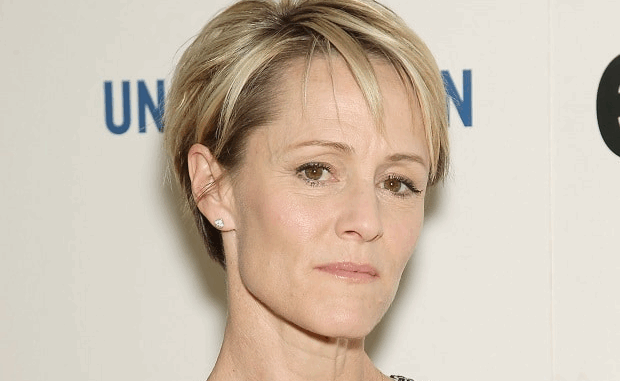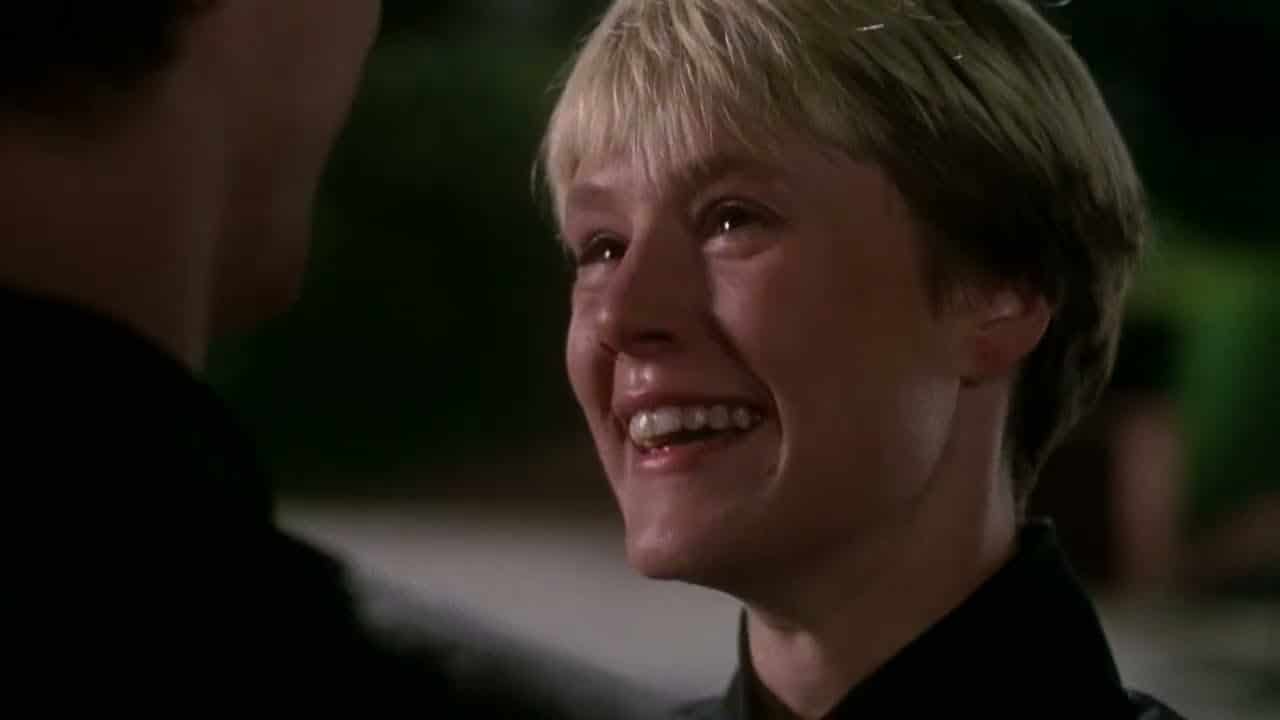
Early Life and Family Background
Mary Stuart Masterson was born on June 28, 1966, in Manhattan, New York City, into a creative and intellectual family deeply rooted in the arts. Her father, Peter Masterson, was an actor, writer, and director, and her mother, Carlin Glynn, was a Tony Award-winning actress. Growing up in such an environment, Masterson was surrounded by stage scripts, artistic conversations, and creative mentorship, giving her a natural entry into the entertainment world.
Her first appearance on screen came at just eight years old, in The Stepford Wives (1975), where she acted alongside her father. Although she would later study anthropology and psychology at New York University, the pull of the screen was strong, and she eventually returned to pursue acting full-time.
Breakthrough in Film and Rise to Prominence
While she had already earned acclaim in earlier roles like At Close Range (1986) and Some Kind of Wonderful (1987), it was her role as Idgie Threadgoode in Fried Green Tomatoes (1991) that became her defining performance. Playing the rebellious, free-spirited, and fiercely loyal Idgie, Masterson brought both heart and grit to the character.
The film, adapted from Fannie Flagg’s novel, became a cultural touchstone for its nuanced portrayal of female friendship, love, and resilience in the face of deep societal restrictions. Masterson’s Idgie—playful, brave, and emotionally complex—won over audiences, especially for her layered chemistry with Ruth, portrayed by Mary-Louise Parker.
Her portrayal earned her a nomination for the 1992 MTV Movie Award for Best Female Performance and helped solidify her status as one of Hollywood’s most intriguing and emotionally rich actresses.
Beyond Fried Green Tomatoes: A Dynamic Career

Masterson’s career continued to flourish in the years following Fried Green Tomatoes. She went on to star in a range of projects that showcased her versatility—from romantic dramas to edgy thrillers and character-driven independent films. Among her notable performances were roles in Benny & Joon (1993), opposite Johnny Depp and Aidan Quinn, and Bad Girls (1994), where she shared the screen with Madeleine Stowe, Drew Barrymore, and Andie MacDowell.
In addition to her acting, Masterson has also ventured into directing. In 2007, she made her directorial debut with the film The Cake Eaters, a poignant indie drama that premiered at the Tribeca Film Festival. The film, which dealt with grief, disability, and family dynamics, was praised for its sensitivity and emotional depth, proving that Masterson was just as adept behind the camera as she was in front of it.
Personal Life and Advocacy
Mary Stuart Masterson is known not only for her artistic contributions but also for her commitment to social causes and independent storytelling. In her personal life, she has often kept a low profile. She was previously married to actors George Carl Francisco and later Damon Santostefano. She is currently married to actor Jeremy Davidson, with whom she shares four children. The couple live in Hudson Valley, New York.
Masterson has been an active voice in championing more inclusive and equitable representation in film and television. She is the founder of Stockade Works, a non-profit organization that aims to support sustainable economic development through training and job creation in film, television, and tech in the Hudson Valley area. The organization focuses especially on people from underrepresented communities.
Recent Work and Continued Influence
In the past decade, Masterson has returned to the spotlight with performances in television series such as Blindspot, NCIS, and For Life. In these roles, she often portrays women of intelligence, authority, and moral complexity, reflecting her own evolution as an artist and individual.
What continues to make Masterson compelling is her unwavering authenticity. She avoids celebrity spectacle, choosing instead to work on projects with depth and substance. Her quiet determination and commitment to craft have inspired a generation of actors, especially women, to seek stories that reflect real human experience.
The Enduring Power of Idgie
Over 30 years later, Masterson’s portrayal of Idgie Threadgoode remains a landmark in American cinema. The character has become iconic, symbolizing freedom, non-conformity, and the strength of chosen family. For many fans, Idgie was also a subtle but powerful example of queer representation at a time when such characters were rare in mainstream film.
Masterson has spoken thoughtfully about the cultural impact of Fried Green Tomatoes. She has acknowledged the resonance of Idgie and Ruth’s relationship with LGBTQ+ audiences and the ways in which the film allowed for an emotional intimacy between women that was rarely depicted in 1990s Hollywood.
She has also remained a frequent guest at fan events, film retrospectives, and LGBTQ+ panels, often reflecting on the role that changed her life and the many lives it touched.
Legacy and Future Directions
Today, Mary Stuart Masterson is seen not just as a talented actress, but as a pioneer for women in film who never compromised her values for fame. Whether mentoring young filmmakers, directing thoughtful dramas, or advocating for local artists, she continues to impact the entertainment industry in profound and lasting ways.
As fans revisit Fried Green Tomatoes, her performance remains a masterclass in character-building and emotional honesty. With each passing year, it becomes clearer that her legacy, like Idgie’s, is one of boldness, loyalty, and a refusal to be anything but true to herself.
